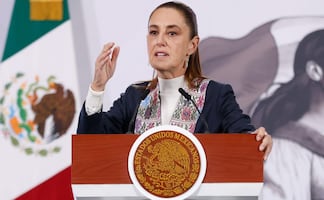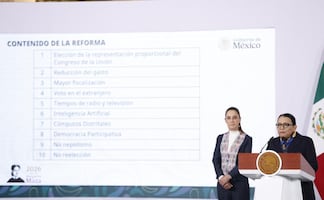Más Información

Guatemala refuerza su frontera con México tras muerte de "El Mencho"; busca evitar "casas de seguridad o corredores de escape"

Sheinbaum afirma que no hay derrota si reforma electoral no se aprueba; estoy obligada a enviar lo que pidió la gente, dice

Reforma electoral: Estos son los 10 puntos clave; plantea que el Congreso tendrá 500 diputados por elección directa y 96 senadores

Acusa FGR a dos detenidos en operativo contra “El Mencho”; los señala por portación de armas de uso exclusivo de Fuerzas Armadas
The governments of Mexico and the United States have recently signed a new agreement as part of the International Boundary and Water Commission, Minute 323 , stating that in exchange for the economic assistance provided by the U.S. for the development of hydraulic infrastructure in Mexican territory, the U.S. shall obtain a specific amount of water obtained from Mexican territory.
Minute 323, known as Extension of Cooperative Measures and Adoption of a Binational Water Scarcity Contingency Plan in the Colorado River Basin was negotiated – according to certain sectors – without a prior public announcement and without consulting with those who might be affected by this new provision.
The document was prepared by the International Boundary and Water Commission (IBWC) of Mexico and the United States, and was signed on September 21, 2017 , and was made public five days later.
The negotiation includes provisions for investments and projects, stating the commissioners agreed to continue developing projects and launching actions in favor of the conservation of the water of the Colorado River, authorizing a portion of the water produced to be used for environmental needs and for its distributed between both countries.
“The United States shall contribute with a total of USD$31.5 million through the IBWC to develop water efficiency and conservation projects in Mexico. All the water generated or conserved arising from this investment shall be assigned to Mexico, with the exception of the following volumes: 86 million of cubic meters of water to comply with the commitment of the United States to improve environmental conditions, especially the border section and the Colorado River delta,” reads the minute.
“Literally, the U.S. is purchasing water . This country is paying 31.5 million dollars as an alleged investment in Mexican territory but they just want the water, but this water belongs to Mexico because it comes from our country. They are entitled to millions of cubic meters, the minute states so, and it's only a paint job, they say they'll use it for the environment, for the Colorado River. They hide behind euphemisms; it's literally a purchase of Mexican water,” says José Zavala, a researcher at the College of the Northern Border.
Minute 323 includes the approval of institutions such as Pronatura, the College of the Northern Border, the Autonomous University of Baja California, the Sonora Institute, among others. However, Zavala claims the name of the organizations has been used in a personal capacity because the approval was given by the specific individuals involved in the project.

(File photo/EL UNIVERSAL)
A joint project since 1944
The Water Treaty between Mexico and the United States was signed on February 3, 1944. It establishes that Mexico shall provide water to the U.S. from the Rio Grande/Bravo , while the U.S. shall provide water to Mexico from the Colorado River .
This agreement establishes water supply to the United States according to specific cycles. The original treaty mentions that in case of drought, shortages will be recovered from the following cycle.
There are currently 35 million American citizens and 2 million hectares dependent on the Colorado River water supply.
During the first quarter of 2017, the Center for American Progress (CAP) cautioned that U.S. President Donald Trump could jeopardize water supply given his imprudence in handling Mexico-U.S. relations.
A study by this organization stated the rights to the Colorado River water are determined by this 1944 treaty but the rights had to be revised by the end of 2017. A treaty that President Trump would have to renegotiate with Mexico.
“A fracture in the relations bewteen the United States and Mexico could endanger other treaties, add more tension to water supply, and cause a water shortage with a devastating effect on jobs and the economy,” claimed the study.
During the Barack Obama administration, Minute 319 was signed, allowing Mexico to store water at Lake Mead.

(Colorado River – Photo: Julie Jacobson/EL UNIVERSAL)
More than a negotiation
The Center for American Progress highlighted the shared benefits of giving Mexico a new storage space to increase water levels and prevent water shortage.
Now, with Minute 323, this negotiation resembles more a transaction. It defines that the agreement shall be valid for nine years and Mexico shall have to take the necessary actions to meet its commitments at the same time the U.S. funds are transferred.
“Regardless of whether the money is invested or not, the United States will retain the specified amount of water but the thing is that this is Mexican water, it's in Mexican land,” said the José Zavala, the researcher.
According to Mexican Senator Marco Blásquez , of the far-left Labor Party (PT), petitioned for the Mexican President to order the Minister of Foreign Affairs, Luis Videgaray, to reject Minute 323 as it goes against national interests.
“Minute 323 contains several items that affect the Mexican people and the inhabitants of the Mexicali Valley, since it authorizes the sale of water to [American] organizations under the front of it being a water infrastructure program,” said Blásquez.
However, Víctor Sánchez, another researcher at the Northern Border College, claims Minute 323 is just a continuation of Minute 319.
“It's about preparing for a possible reduction in water volume in the future, because of climate change, that could affect water supply,” he said, adding that Mexico has to comply with a water supply shcedule but that since Mexico has nowhere to store the water it is currently being kept at U.S. dams.
“It's a reservoir in case of contingencies,” Sánchez explained, although he recognized that the way the negotiation was handled – without attracting attention – is what should be a “cause of concern”, as the act “addresses a pressing issue and someone has to provide certainty for the future.”
Not a sale: Mexican Ministry of Foreign Affairs
The Mexican Ministry of Foreign Affairs has ensured Minute 323 is not a purchase agreement.
“It only enables the participation in a water conservation and efficiency programs based on voluntary improvements to the irrigation infrastructure,” claims the Ministry.
They mentioned the USD$31.5 million will be used, voluntarily, by irrigation modules which need to invest in improvements but lack the resources to do so.
“They will be able to access resources through the temporary exchange of a determined volume of water under their jurisdiction, without compromising their rights.”
The Ministry added that the negotiation of Minute 323 took five years and that several organizations, agencies, and users were consulted.
am
Noticias según tus intereses
[Publicidad]
[Publicidad]










